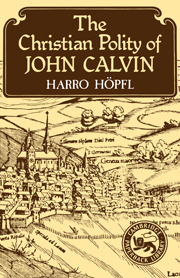Book contents
- Frontmatter
- Contents
- Preface
- Note on sources, orthography, notes and translations
- Introduction
- 1 The training of a lawgiver
- 2 The Institution: the first version
- 3 The first public ministry
- 4 Reconstruction
- 5 The Institution of 1543
- 6 Geneva and Calvin, 1541–64
- 7 The civil order of a Christian commonwealth
- 8 Political morality in the thought of Calvin
- 9 The laws and mores of a Christian commonwealth
- 10 Unfinished business: a speculative summary and postscript
- Appendix I Calvin's conversion
- Appendix II Predestination
- Notes
- Bibliography
- Index
- Cambridge Studies in the History and Theory of Politics
2 - The Institution: the first version
Published online by Cambridge University Press: 24 October 2009
- Frontmatter
- Contents
- Preface
- Note on sources, orthography, notes and translations
- Introduction
- 1 The training of a lawgiver
- 2 The Institution: the first version
- 3 The first public ministry
- 4 Reconstruction
- 5 The Institution of 1543
- 6 Geneva and Calvin, 1541–64
- 7 The civil order of a Christian commonwealth
- 8 Political morality in the thought of Calvin
- 9 The laws and mores of a Christian commonwealth
- 10 Unfinished business: a speculative summary and postscript
- Appendix I Calvin's conversion
- Appendix II Predestination
- Notes
- Bibliography
- Index
- Cambridge Studies in the History and Theory of Politics
Summary
CALVIN IN 1535
The De dementia Commentary was the beginning and also the end of Calvin's projected career as a humanist scholar. Less than three years after its publication he was an exile living in Basel in straitened circumstances and under the assumed name ‘Martianus Lucianus’. His decision to leave France was precipitated by fear of persecution, and by conclusive evidence that Francis I, previously an uncertain and ambivalent defender of humanists, had finally espoused the Sorbonne's interpretation of what was to count as orthodoxy. It is impossible to say what kind of evangelical Calvin was at his arrival in Basel, a place notable for its de facto tolerance of a wide diversity of opinions. Nor is it possible to say at what date Calvin conceived or began the execution of the first Institution. We do not know either whether Calvin was now putting on record reflections long since habitual with him, or whether it was writing the Institution which itself crystallized his thoughts. All that can be said with confidence is that since the De Clementia Commentary Calvin had published nothing except two Prefaces to Olivetan's French translation of the New Testament (which were written, it appears, shortly after his arrival at Basel), and had written, but left unpublished, Psychopannychia. It is apparent, then, that some time before he left France, Calvin's attentions had been concentrated entirely on theology, and that it was evangelical, and not merely humanist, theology.
- Type
- Chapter
- Information
- The Christian Polity of John Calvin , pp. 19 - 55Publisher: Cambridge University PressPrint publication year: 1982

